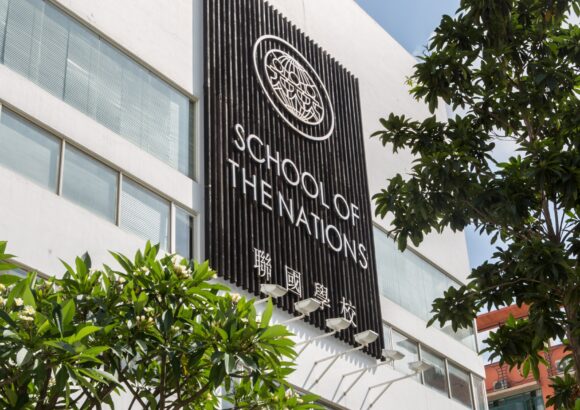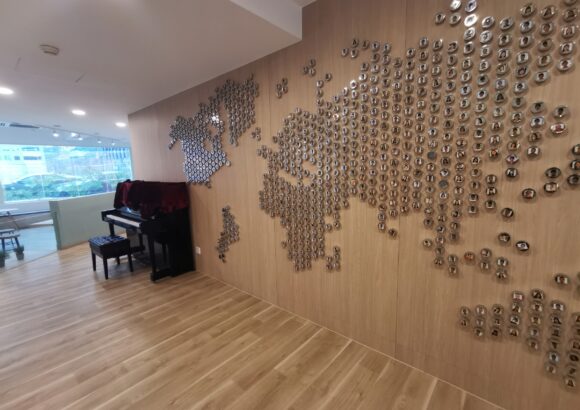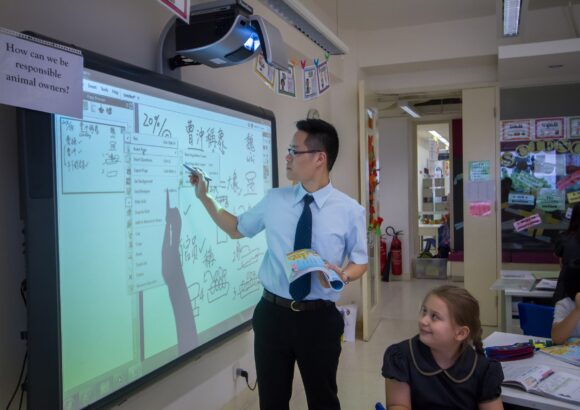I appreciate the chance to work at SON. Because I totally agree with the vision of the school, that we train our students to be outstanding not only in academic performance, more important is the moral structure which will guide their whole life.
Teacher Perspectives
Each school has a distinct culture.
Prospective teachers need a clear picture of the ethos and working environment at School of the Nations to determine whether or not they would excel here. Individual online reviews may not match what most teachers experience and often raise points that would benefit from further context and clarifications. To provide prospective staff with insights into the school environment, responses to an anonymous online survey of teachers that was carried out in early 2021, as well as Questions & Answers, are shared below.
Teacher Survey
Key Findings:
What is it like working at School of the Nations?
This survey is intended to provide applicants with a balanced snapshot of the perspectives of current teachers.
It was carried out in January 2021, with a response rate of nearly 60%
Read the full report
School Ethos
94% of teachers reported having a sense of meaning and purpose from teaching at SON.
Four out of five teachers agreed or strongly agreed that the school prioritizes “student learning and development” over all other objectives.
Several teachers mentioned that the school felt like a big family.
Recommending SON
98% of teachers who responded would recommend SON as a place to work.
There was almost universal agreement that some teachers thrive more at the school than others.
Qualities to Thrive at SON
The most common attributes identified for success at the school were being open-minded, positive, collaborative, reflective, resourceful, resilient, and aligned with the vision of the school.
The school was described as a distinctive place to work, one that required humility and flexibility from teachers to integrate into and flourish.
What Teachers Like Most
Teachers had very high satisfaction with their role at the school.
All teachers reported that colleagues help each other when needed.
85% of teachers who responded: felt that their work was valued by the school and were satisfied with their compensation.
School Administration
The vast majority of teachers who responded reported positive relationships with their administrator/supervisor.
While the feelings of teachers being supported and valued were good on average, this was not uniform and could be improved.
Baha’i-inspired Approach
76% of teachers who responded indicated that they were consistently making efforts to enrich their understanding and application of the school’s conceptual framework and educational approach. Most teachers expressed appreciation of the school’s Baha’i-inspired approach to education. However, what this looks like practically and how to carry it out remains an area of learning for both the school and its teachers.
School Overall
Most teachers reported that the school cares about its staff and that it was improving.
Some teachers indicated mixed feelings about the school, especially those who reported that they were not as active in understanding and contributing to the school’s aims.
Questions & Answers
Our curriculum seeks to respond to the educational needs of our students and society. In our approach to curriculum, we draw on insights from established theories, while engaging in a rigorous search for educational content and methods that prepare students to make a constructive contribution to a rapidly changing world.
Some of our curricular materials have been developed at the school through a process of action and reflection, resulting in programmes that are attuned to our vision and local context. We also draw on proven international programmes that are carefully selected and adapted to our aims and the local reality. Read more about our Approach to Education to appreciate the choices and ongoing development we undertake with Our Curriculum.
The school exists only to serve the best interests of our students, to provide a safe and supportive environment where their vast potential can be realized. Reflecting this priority, 80 percent of teachers agreed that the school prioritizes “student learning and development” over all other objectives. The school has a full complement of teachers providing various kinds of Student Support and has specific processes for student safety. Our school draws on the Cooperative Disciple approach to classroom management. This is part of an effort to avoid approaches to discipline that tend towards extremes of being either punitive or overly permissive.
Our approach to discipline is based on our belief in the nobility of each student, the importance of understanding and addressing underlying causes of misbehavior, and encouraging students to feel capable, connected, and contributors in the classroom. Physical safety is of paramount concern. There is a biometric gate in the lobby and CCTV cameras installed in classrooms and public areas for security purposes. During recess and transitions in the school day, teachers are assigned duties to supervise various locations around the school. A safety system is in place that allows students with personal or interpersonal challenges to be assisted, usually by volunteer teachers or special arrangements, until an issue is resolved. Procedures are in place to escalate serious incidents to parents and authorities should they occur. All teachers and staff are encouraged to raise issues at any time with their administrator or with the Director. We understand that strong safety procedures will never prevent all incidents. As such, the school strives to learn from past issues and anticipate future challenges to ensure the safety of all students on campus.
Macau’s Education Department (DSEDJ) provides a substantial training and development subsidy for all teachers every four months. There are no restrictions to how these funds can be used. As teachers accumulate experience, this amount is increased if certain requirements are fulfilled. Our school ensures that teachers have the training they need to deliver certain programs, such as the International Baccalaureate Diploma Program. Beyond this, teachers may complete any professional development course they wish outside of work hours. In addition, for some time, our school focused on sending teachers abroad to participate in professional training sessions and inviting leading educational experts to offer workshops at our school. Our experience matched the latest research on the subject: one-off trainings, while often exciting and stimulating, largely fail to produce sustained change in the classroom. Beginning in 2015, the school created opportunities for further exploration of certain elements of its vision and conceptual framework by establishing the weekly Professional Learning Community (“PLC”) sessions. This experience at the beginning was mixed, for some the purpose was not as clear and much was left to the teachers to apply what was being studied, while others felt they benefitted from the explorations. In the years since, balance has been sought between traditional professional development topics such as “Cooperative discipline” and “Inquiry-based learning,” and deepening understanding of the school’s vision and framework, with topics such as “Moral Empowerment,” “Community Service,” and the “Aim of Education.” The response to PLCs was generally positive. Individually, teachers reflected deeply on the concepts and begin incorporating some ideas into the classroom. Adjustments were made each year although teachers consistently requested that this training be more practical and with a greater emphasis on improving their professional practice. From around 2019, the school has implemented a promising collaborative approach to training called “lesson study”, drawing on global learning about enhancing teachers’ educational practice. Since its introduction and after some expected growing pains, our experience with the lesson study approach has matured, offering more tangible benefits to teachers as experience accumulated and feedback was incorporated. Three early challenges were overcome in 2021-2022 by operating in two discrete cycles, providing more support at beginning of the year, and allowing teachers to form their own groups and set their own research questions. The response has been encouraging, with groups who invest in the process reporting the largest benefits. Connected to professional development, 75% of our current teachers feel they are provided the resources they need to do their job well, while 22% are undecided and 3% would disagree—according to our 2021 Teacher Survey. Through it all, the school endeavors to provide teachers with meaningful professional development that focuses on improving professional practice and deepening understanding of the school’s Bahá’í-inspired approach. We recognize that no style of professional development will appeal to every teacher and that regular refinements and an openness to try new methods based on teacher feedback seems most effective.
All teaching staff at the school must be registered as teachers with the Education Department (DSEDJ) and meet specific requirements. This is listed in each job description and is standard for all schools in Macau. For example, all Kindergarten and Primary teachers must have teaching qualifications (e.g. B.Ed, PGCE) in that age group to teach any subject. Secondary teachers must have a Bachelor’s degree or significant course work to teach particular subjects. A teaching degree is not required at Secondary. Above these minimum requirements, there are other qualifications and characteristics that our school looks for in the teachers we employ. Having relevant experience, advanced degrees, and teaching qualifications—for Secondary teachers—is highly valued, along with other desired qualities and a pedagogical approach that is consistent with the school’s objectives. Like all schools that hire qualified international staff abroad, some challenges can arise upon arrival. Accordingly, we are continuously refining our screening and administrative procedures to ensure that teachers who are hired would thrive in the context of both the school and Macau.
The school currently has four level administrators—responsible for Kindergarten, Primary, Middle School, and Secondary—along with a School Director. From at least 2013, the school no longer hires directly into these roles but rather assigns from within. We hold a distinct conception of the role of administrators. Rather than being positions of power or prestige that one actively seeks out, we view administrators as humble supporters of teachers and students who have accepted the role when approached. The requirements for this role concentrate heavily on personal qualities and relevant knowledge, attitudes, and skills. In administrators, we look for strong organization, genuine concern for others, solid interpersonal skills, and a strong understanding and appreciation for our school’s vision and approach. There are no requirements that one be a Baha’i to be a member of the administration of the school, as demonstrated in the current and past composition of the administrative team. Insights into the nature of the relationship between teachers and administrators can be gleaned from the comprehensive 2021 teacher survey. In it, the responses underscored the positive feelings that almost all teachers have for their administrator/supervisor, with data suggesting that this is accomplished by efforts from both sides. Over 90% of teachers who responded felt that their supervisors create a warm environment, while some 70% of respondents feel they have sufficient support. Addressing the openness of the relationship, 93% of respondents felt comfortable discussing issues they were facing at work with their administrator. Concerning resources and support, 78% reported their supervisor provided useful feedback on how they were doing. Further, 73% felt their supervisor helped them to develop and grow. Just 4% teachers explicitly disagreed with these statements, while 18% to 25% selected “neither agree or disagree” suggesting some ambivalence in this area.
The degree of classroom autonomy teachers perceive is closely associated with expectations and past teaching experience. There is an expectation that teachers choose to join the school because they are attracted to our approach to education and learning. Naturally, the school has certain expectations and standards that it expects teachers to fulfill. We have found that teachers who are open-minded and willing to learn find ample space to carry out their classes with creativity and autonomy. Over 93% of teachers reported having a sense of meaning and purpose from teaching at SON, in a 2021 survey. The school leaves lesson plans entirely up to teachers, only requesting unit plans. Administrators occasionally visit classes and do so mostly to offer support.
School of the Nations is a Baha’i-inspired school, which is a concept that neither embodies the familiar conceptions of a religious school or of a secular school. This inspiration is reflected in our Approach to Education and clarified in our school’s Conceptual Framework. Our vision requires teachers to move beyond traditional ideas of religion and education. The school’s central aim is to create an environment where students can fully develop their intellectual, physical, and moral capacity in the context of selfless service to others. To accomplish this, we are collectively clarifying our Baha’i-inspired approach by making certain elements explicit and reflecting on our accumulating experience. In this manner, we can increase consistency between our aspirations and practice. Our teachers appreciate our distinct approach to student development and the potential it holds. Over the years, custom programmes have been created or adopted that closely reflect our vision. These have proved quite successful. Less effective were abstract efforts to familiarize teachers with our approach without guidance on implementation. Nonetheless, overall understanding of the school’s vision and approach is increasing across the board and prospective staff can read almost two dozen comments in Appendix D of the 2021 teacher survey. For the benefit of our students, we hope all teachers will eagerly advance to the forefront of reflecting professionally and embodying personally the elements of our approach. To this end, the school assigns responsibilities based on depth of understanding and ability to create a suitable environment, rather than professed personal beliefs.
Yes, we provide letters of reference when they are required by current and former staff seeking new employment—often in later stages of such applications. From around 2016, we realized it was not practical to write general references letters whenever requested. Like other schools in the region, we amended our policy and now routinely provide employment letters, which confirm the dates of employment along with the job title and responsibilities. For most teachers, this has proved more than sufficient. However, in specific cases where a detailed letter of reference or questionnaire is required for a position, we happily oblige. We greatly value our former staff and wish to do everything possible to assist them to use the training and experiences that they gained here to enrich many more classrooms and school communities.
Over the years, the school has used a wide range of platforms and approaches to recruit exceptional teachers from around the world. From 2017, our school transitioned almost exclusively to online methods for hiring teachers and moved away from attending job fairs. As a school with a distinct approach to education, it is mutually beneficial for teachers to have more time to learn about and engage with us before joining. A process with multiple steps and conversations has proven best. Recent feedback from applicants and new teachers about our hiring process has been positive. Yet while the process has become more informative and responsive we are still refining and improving the system.
We feel that all prospective teachers deserve access to accurate information about a school before they join. The school generally refrains from responding directly to online reviews since such fora have a limited ability to convey a balanced perspective. As an organization dedicated to learning, we welcome all sincere and good faith feedback. Occasionally, issues and points raised online or in-person are addressed here, when it is determined they might be of general interest. We have found that most issues are best explored in a constructive dialogue, where various perspectives and insights are shared and reconciled, and a path forward charted. As such, we listen to all views raised by current and former staff, try to make corrections as needed, and present the reality of the school rationally and accurately on our website and during the application process. The 2021 teacher survey offers a look at the impressions of our teachers toward the school’s learning and working environment.


